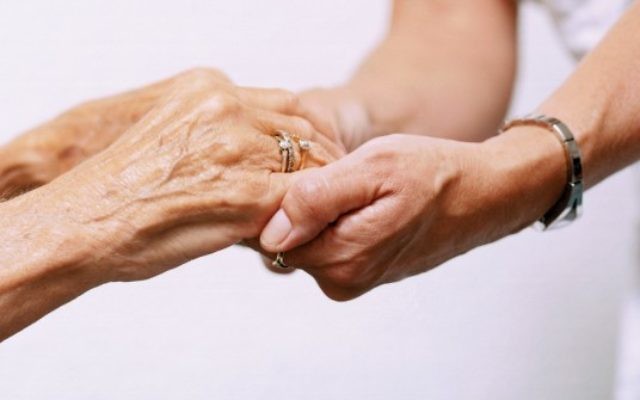Shoah survivor who ‘felt like a prisoner’ in care, allowed home
A 90-year-old Holocaust victim with dementia will return to their house after comparing residential care to being in a 'concentration camp'
A Holocaust survivor who wants to leave a care facility and has complained of ”feeling like a prisoner again in the concentration camp” is set to be allowed to return home on a trial basis.
The woman, who is in her 90s and has dementia, is at the centre of litigation in the Court of Protection – where judges consider issues relating to people who lack the mental capacity to take decisions – in London.
Council social services staff have asked District Judge Anselm Eldergill to make decisions about what is in the best interests of the pensioner, who was held in a Nazi concentration camp during the Second World War.
One issue being considered relates to the woman’s human right to liberty.
Judge Eldergill was told, at the latest hearing on Wednesday, that the pensioner had asked if she could be cared for at home on a trial basis.
Social services staff and the woman’s daughter had agreed to the idea – and the judge gave his approval.
The judge heard from lawyers representing the pensioner and social services bosses – and from the pensioner’s daughter.
He said the pensioner could not be identified.
The judge also said the name of the council involved could not be published in case an information jigsaw was created which revealed the woman’s identity.
Barrister Lee Parkhill, who represented social services bosses, told the judge that the woman has vascular dementia, an acute kidney problem, diabetes and hearing difficulties.
He said she had last year been assessed as lacking the mental capacity to make decisions about where she lived and about her care.
Mr Parkhill said she had been admitted to hospital following a fall at home then placed in a care facility more than two years ago.
He said her family thought that she could not manage at home.
Mr Parkhill indicated that a judge had earlier authorised the woman’s ”deprivation of liberty” at the care facility under the terms of mental capacity legislation.
The pensioner had ”consistently” said she wanted to leave the care facility, Judge Eldergill has been told.
She made references to ”feeling like a prisoner again in the German concentration camp” and just wanting to be ”free from this place”.
Her confinement in a concentration camp was one of the reasons why she placed such “high value on her liberty”. She said she wanted to be buried in Israel.
Earlier this year the woman’s daughter said she thought that her mother’s desire to leave the care home was an ”unrealistic aim”, said Mr Parkhill.
She thought that her mother was being well cared for.
But on Wednesday she said she was in favour of her mother being cared for at home on a trial basis.
“It is to me a sensible way forward,” she told Judge Eldergill.
“I more than anybody would not want to deprive her of her liberty.”
She added: “I would not want her staying in the environment she is in if she will not settle there.”
Judge Eldergill was told that it would take time for arrangements to be made for the care-at-home trial.
He is due to reconsider the case next year.
The pensioner is being represented by barrister Katarina Sydow – who has been instructed by the Office of the Official Solicitor, which offers help to vulnerable people embroiled in litigation.
Judge Eldergill, who has visited the pensioner, added: “We owe it to her to give her a fair chance.”

Thank you for helping to make Jewish News the leading source of news and opinion for the UK Jewish community. Today we're asking for your invaluable help to continue putting our community first in everything we do.
For as little as £5 a month you can help sustain the vital work we do in celebrating and standing up for Jewish life in Britain.
Jewish News holds our community together and keeps us connected. Like a synagogue, it’s where people turn to feel part of something bigger. It also proudly shows the rest of Britain the vibrancy and rich culture of modern Jewish life.
You can make a quick and easy one-off or monthly contribution of £5, £10, £20 or any other sum you’re comfortable with.
100% of your donation will help us continue celebrating our community, in all its dynamic diversity...
Engaging
Being a community platform means so much more than producing a newspaper and website. One of our proudest roles is media partnering with our invaluable charities to amplify the outstanding work they do to help us all.
Celebrating
There’s no shortage of oys in the world but Jewish News takes every opportunity to celebrate the joys too, through projects like Night of Heroes, 40 Under 40 and other compelling countdowns that make the community kvell with pride.
Pioneering
In the first collaboration between media outlets from different faiths, Jewish News worked with British Muslim TV and Church Times to produce a list of young activists leading the way on interfaith understanding.
Campaigning
Royal Mail issued a stamp honouring Holocaust hero Sir Nicholas Winton after a Jewish News campaign attracted more than 100,000 backers. Jewish Newsalso produces special editions of the paper highlighting pressing issues including mental health and Holocaust remembrance.
Easy access
In an age when news is readily accessible, Jewish News provides high-quality content free online and offline, removing any financial barriers to connecting people.
Voice of our community to wider society
The Jewish News team regularly appears on TV, radio and on the pages of the national press to comment on stories about the Jewish community. Easy access to the paper on the streets of London also means Jewish News provides an invaluable window into the community for the country at large.
We hope you agree all this is worth preserving.






















